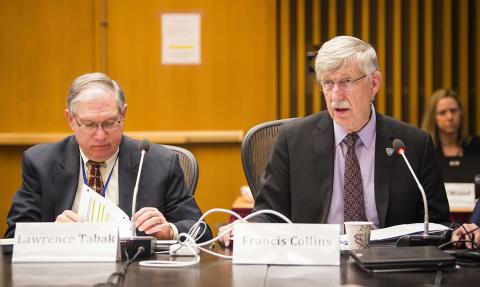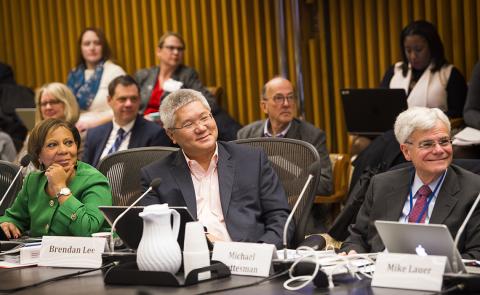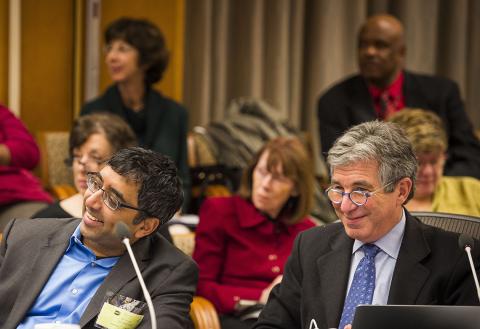ACD Gets Updates on Opioid, ‘Next Gen’ Initiatives

Photo: Lisa Helfert
Stopping a current crisis and preventing a future one were just two items that packed the agenda of the 115th meeting of the advisory committee to the NIH director (ACD) on Dec. 14-15. Slowing the nation’s opioid abuse/overdose epidemic and reconfiguring grant funding to reward more innovation earlier in young careers were two of the thorniest topics that the ACD considered at its recent 1½-day session.
In opening remarks, NIH director Dr. Francis Collins put the drug abuse issue in perspective. Noting that all government agencies have been called upon to address the epidemic from all angles, he said that, although no additional research funding has been appropriated for the effort, NIH will do its part to “bring the best science to end the opioid crisis…In the course of the last few years, it’s been getting worse and worse…Now something in the neighborhood of 175 people a day are dying of overdoses—most of those from opioids. More people now are dying per day than at the peak of the AIDS epidemic…We have no justification for anything other than all hands on deck.”
NIDA director Dr. Nora Volkow, who is at the forefront of the NIH Opioid Research Initiative, briefed the ACD on day 2.
“This is the main crisis that we are facing as a nation and what’s disturbing is that we aren’t controlling it and we’re seeing the fatalities go up significantly,” she said.
NIH’s initiative begins with the premise that over-prescription of drugs to manage pain contributed to the crisis, so safer and more effective strategies for pain relief are fundamental to the solution. Additionally, NIH is focusing on two key research areas—innovations to treat opioid addiction and new interventions to prevent and to reverse overdoses.

Photo: Lisa Helfert
Volkow reviewed some of the latest science on addiction, including potentially significant advances in the area of identifying biomarkers for personalized treatment of opioid use disorder (OUD). She concluded with a 6-item future research priority list developed just days prior to the ACD meeting at several large multi-agency, multi-organization meetings:
- Strengthen connection between research and practice
- Explore and use all data sources and study designs
- Engage citizen scientists to help develop metrics for quality of care for OUD treatments, based on reports of actual patient experience
- Determine criteria for inpatient versus outpatient treatment
- Establish most effective treatments for incipient or mild opioid use disorder, which accounts for the largest population in which interventions may have the biggest impact
- Research on costs and sustainability.
Additionally, the NIH public-private partnership to “Address the Opioid Crisis” coordinated by the Foundation for NIH identified two major focus areas—one related to treating opioid addiction and preventing and reversing overdoses; the other towards developing resources and infrastructure to help in the development of potent but safe and non-addictive pain medications.
In an example of the situation’s urgency, Volkow also shared a fast-tracked funding opportunity announcement that NIDA released Dec. 14. The announcement—designed to facilitate creation of partnerships between academicians and the pharmaceutical industry for development of medications to treat or prevent OUD and overdose—remains open through Jan. 25.
Turning toward staving off what could become a future innovation crisis in scientific research, the ACD also learned more about progress on the Next Generation Researchers Initiative (NGRI). “Next Gen” was introduced in spring 2017 to identify novel, measurable ways to restructure the grants process in order to encourage and retain young scientists who are early in their research careers.
“There could hardly be a topic of greater importance if we’re thinking about our future than making sure that we’re providing a pathway for the best and brightest of this next generation,” Collins said. “We need to encourage their vision and [help make their] dreams happen and for science to benefit.”
NIH principal deputy director Dr. Lawrence Tabak, who co-chairs the initiative, described NGRI as “one of the most intensely discussed issues in the scientific community.” He said hundreds of comments from all corners of research flooded his email inbox after Next Gen was announced.
A diverse working group was assembled to tackle a host of concerns, including:
• How NGRI defines the terms “early-stage” and “early-established” investigator
• Determining the correct funding balance for “safe” versus “risky” or “innovative” science
• The research culture’s complex relationship with R01 grants, long considered the top measure of success for a scientist.

Photo: Lisa Helfert
In next steps, NGRI will consider monitoring more closely the number of investigators that it funds (not merely the number of grants) and perhaps providing recommendations to prioritize funds, so that investigators who have just missed the payline and are at risk of losing all support are funded.
“At the end of the day, we probably won’t get the perfect solution—in that we’ll get some things for all, but it will not be perfect in terms of expected outcome,” said ACD member Dr. Brendan Lee of Baylor College of Medicine.
Next Gen is a component of the 21st Century Cures Act that Congress passed in 2016. At the ACD meeting a day earlier, Collins had alluded to the importance of nurturing new talent and diversity in research when he talked about lawmakers who had recently come to campus for briefings.
“They’re excited to meet investigators, but when they get the chance to see young scientists in training, they get really excited,” Collins said, referring to members of Congress who tour NIH. “They should—that’s often the best part of the visit.”
ACD member Dr. Elba Serrano of New Mexico State University agreed that making Next Gen a priority is crucial.
“The reason we’re doing this is because Congress got it right,” she emphasized. “We have to do this for biomedical research to flourish and go into the future. We are working in a system that was developed in the ’60s and ’70s and a generation rode that wave into the 21st century, but now we’re in a very different place, a place of team science—possibly the best trained we’ve ever had—and they need their chance to contribute, just like we had ours.”
ACD member and Next Gen working group co-chair Dr. Jose Florez of Massachusetts General Hospital praised the subcommittee’s composition and direction.
“If there’s any doubt in anybody’s mind that diversity’s enriching, [then] I have tangible experience by being on this group,” he noted. “[Hearing from] many different axes really makes a much more rich, productive discussion. In particular the young people who are in the group have been inspirational, thoughtful, articulate, passionate, hard-working and well-informed. Their contribution is particularly valued. I agree with the need to focus on the people rather than grants, expanding the definition of vulnerable at-risk investigators, our desire to make sure that this is a data-driven evidence-based process with scientific rigor…and our desire to not have unintended consequences. The need to continually monitor and evaluate that [NGRI] is having the desired effect is right on target.”
View the archived meeting online at https://videocast.nih.gov/summary.asp?Live=26806&bhcp=1 and https://videocast.nih.gov/summary.asp?Live=26810&bhcp=1. Daily agendas and other meeting documents are also available online at https://acd.od.nih.gov/meetings.html.
